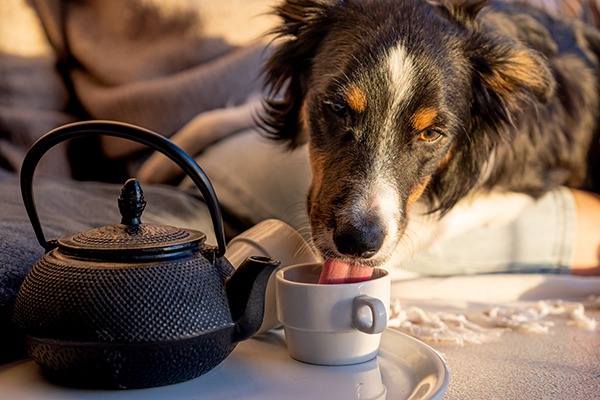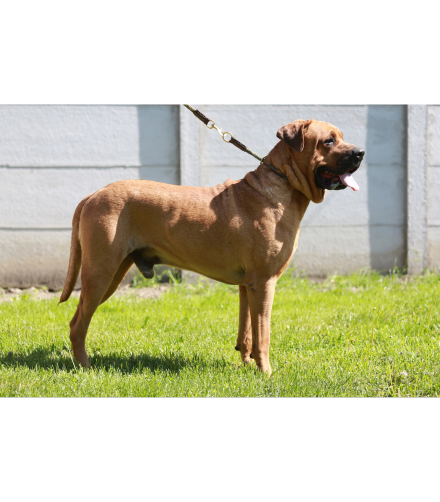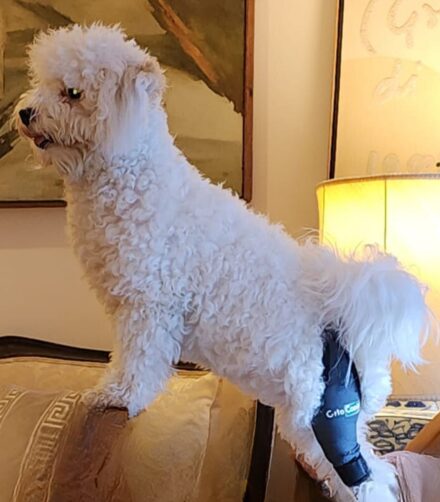As devoted pet parents, we’re always on the lookout for ways to pamper and care for our furry friends. While we’re accustomed to offering them treats and special meals, the question of whether a dog can enjoy a soothing cup of tea might not have crossed our minds.
In the world of canine care, the debate over whether dogs can safely partake in tea has stirred quite a discussion among pet enthusiasts.
Join us as we unravel the mystery behind this canine tea conundrum and explore the potential impact of tea consumption on our beloved four-legged companions.
It’s time to spill the tea on whether our dogs can savor this warm, comforting beverage or if it’s best left to human hands.
Photo Sourced: https://rb.gy/eaox9v
Are Tea Safe for Dogs?
The answer to this question depends on the type and amount of tea that your dog consumes. Tea can be classified into two main categories: true teas and herbal teas. True teas are made from the leaves of the Camellia sinensis plant, which include black, green, white, and oolong teas. Herbal teas are made from the leaves, flowers, or roots of other plants, such as chamomile, peppermint, ginger, and rooibos.
True teas contain caffeine, a stimulant that can affect your dog’s nervous system, heart, and digestive system. Caffeine is toxic to dogs and can cause serious health problems if ingested in large amounts says experts from CanDogsEatAI.
According to the ASPCA, dogs can experience symptoms of caffeine poisoning when they consume 9 mg of caffeine per pound of body weight or more. For a small dog weighing 10 pounds, that means as little as one cup of brewed black tea can be dangerous.
Herbal teas, on the other hand, are usually caffeine-free and may have some health benefits for dogs. Some herbal teas, such as chamomile and peppermint, can help soothe upset stomachs, reduce inflammation, and freshen breath.
However, not all herbal teas are safe for dogs. Some herbs, such as lavender, rosemary, and sage, can be toxic to dogs if consumed in large amounts or over a long period of time. Therefore, it is important to consult your veterinarian before giving your dog any herbal tea.
The Risks of Tea for Dogs
As mentioned above, the main risk of tea for dogs is caffeine toxicity, which can occur when your dog drinks too much true tea. Caffeine toxicity can cause a variety of symptoms, such as:
- Hyperactivity
- Restlessness
- Tremors
- Seizures
- Elevated heart rate
- Elevated blood pressure
- Abnormal heart rhythms
- Vomiting
- Diarrhea
- Increased urination
- Dehydration
- Elevated body temperature
- Collapse
- Death
Caffeine toxicity is a medical emergency and requires immediate veterinary attention. If you suspect that your dog has ingested a large amount of caffeine, do not induce vomiting or give any home remedies. Instead, call your veterinarian or a poison control center right away and follow their instructions.
Another risk of tea for dogs is the presence of other ingredients that can be harmful to dogs. For example, some teas may contain artificial sweeteners, such as xylitol, which can cause low blood sugar and liver failure in dogs.
Other teas may contain milk or dairy products, which can cause digestive upset and lactose intolerance in dogs. Furthermore, some teas may contain spices, such as cinnamon, nutmeg, and cloves, which can irritate your dog’s mouth and stomach and cause allergic reactions.
Therefore, it is important to check the label of any tea product before giving it to your dog and avoid any tea that contains ingredients that are toxic or unsuitable for dogs.
The Symptoms of Tea Poisoning in Dogs
If your dog has ingested a small amount of tea, they may not show any symptoms or only mild signs of discomfort. However, if your dog has ingested a large amount of tea or a tea that contains toxic ingredients, they may exhibit some or all of the following symptoms of tea poisoning:
- Drooling
- Panting
- Coughing
- Gagging
- Vomiting
- Diarrhea
- Abdominal pain
- Loss of appetite
- Lethargy
- Weakness
- Dizziness
- Confusion
- Agitation
- Anxiety
- Depression
- Tremors
- Seizures
- Coma
The severity and onset of these symptoms may vary depending on the type and amount of tea ingested, the size and health of your dog, and the time elapsed since ingestion. Some symptoms may appear within minutes, while others may take hours or days to develop.
If you notice any of these symptoms in your dog, do not wait for them to get worse. Contact your veterinarian or a poison control center immediately and seek medical help.
The Treatment of Tea Poisoning in Dogs
The treatment of tea poisoning in dogs depends on the type and amount of tea ingested, the symptoms displayed, and the time elapsed since ingestion. The goal of treatment is to remove the tea from your dog’s system, prevent further absorption, and provide supportive care.
If your dog has ingested a small amount of tea and shows no symptoms, your veterinarian may advise you to monitor your dog at home and provide plenty of fresh water.
If your dog has ingested a large amount of tea or a tea that contains toxic ingredients, your veterinarian may recommend one or more of the following treatments:

Inducing vomiting:
This may be done if your dog has ingested the tea within the last two hours and shows no signs of neurological or cardiac problems. Your veterinarian may give your dog a medication, such as hydrogen peroxide or apomorphine, to induce vomiting and expel the tea from your dog’s stomach.
Activated charcoal:
This may be given to your dog orally or through a tube to bind to the tea and prevent further absorption into the bloodstream. Activated charcoal may also help reduce the effects of caffeine and other toxins in the tea.
Intravenous fluids:
This may be given to your dog to flush out the tea and toxins from your dog’s kidneys and to prevent dehydration and electrolyte imbalance.
Medications:
This may include anti-nausea drugs, anti-seizure drugs, anti-arrhythmia drugs, and sedatives to control the symptoms of tea poisoning and to stabilize your dog’s vital signs.
Oxygen therapy:
This may be given to your dog to improve their breathing and oxygenation if they have respiratory distress or low blood oxygen levels.
Blood tests:
This may be done to monitor your dog’s liver and kidney function, blood sugar levels, and blood cell counts and to detect any signs of organ damage or infection.
Hospitalization:
This may be required if your dog has severe symptoms or complications that require intensive care and monitoring.
The prognosis of tea poisoning in dogs depends on the type and amount of tea ingested, the symptoms displayed, and the treatment received. Most dogs recover well if they receive prompt and appropriate treatment.
However, some dogs may suffer from long-term or permanent effects, such as liver or kidney failure, heart problems, or brain damage. In rare cases, tea poisoning can be fatal.
The Alternatives to Tea for Dogs
Since tea is not a necessary or beneficial drink for dogs, it is best to avoid giving it to your dog altogether. Instead, you can provide your dog with some safe and healthy alternatives, such as:
- Fresh water: This is the best and most natural drink for dogs. It helps keep your dog hydrated, regulates their body temperature, and supports their organ function. Make sure your dog has access to clean and fresh water at all times and change it regularly.
- Coconut water: This is a natural and refreshing drink that contains electrolytes, antioxidants, and vitamins. It can help replenish your dog’s fluids and energy after exercise or illness. However, coconut water also contains sugar and calories, so it should be given in moderation and not as a substitute for water.
- Bone broth: This is a nutritious and tasty drink that can help boost your dog’s immune system, digestion, and joint health. It can also help soothe your dog’s throat and stomach if they have a cough or an upset stomach.
You can make your own bone broth by simmering bones, water, and apple cider vinegar for 24 hours, or you can buy ready-made bone broth from pet stores or online. Make sure the bone broth does not contain any salt, onion, garlic, or other ingredients that are toxic to dogs.
- Herbal tea: As mentioned earlier, some herbal teas, such as chamomile and peppermint, can be safe and beneficial for dogs in small amounts. However, you should always consult your veterinarian before giving your dog any herbal tea and make sure it is caffeine-free and does not contain any toxic ingredients. You should also let the tea cool down completely before offering it to your dog.
Well, That’s a Wrap
In the quest to understand whether a dog can indulge in a cup of tea, we’ve delved into the nuances of canine health and nutrition. While some herbal teas may offer benefits in moderation, it’s crucial to approach the idea with caution.
Always consult with your veterinarian before introducing any new elements into your pet’s diet. Remember, just like us, our dogs have unique preferences and sensitivities. Ultimately, the verdict on whether a dog can drink tea isn’t a one-size-fits-all answer.
With the right information and guidance, we can continue to make informed choices that prioritize the well-being of our furry companions. Cheers to responsible pet parenting and the endless joy our dogs bring into our lives!




















